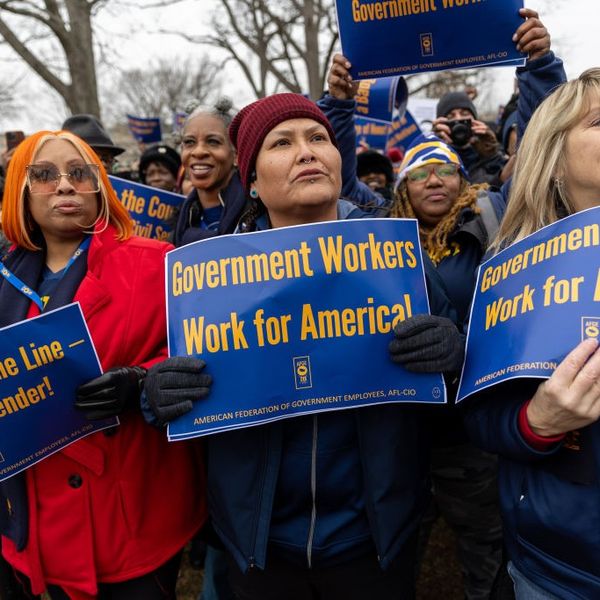In Blow to Unions, Anti-Worker Bill Heads to Wisconsin Governor's Desk
Along party lines, state Assembly passes 'a destructive bill that undoes 75 years of labor peace'
Voting along party lines and following nearly 24 hours of continuous debate, the Wisconsin Assembly on Friday approved anti-worker legislation that bans labor contracts requiring workers to pay union fees.
Republican Gov. Scott Walker, a presumptive 2016 presidential candidate whose assault on organized labor is ongoing, said he "looks forward" to signing the bill on Monday.
As Common Dreams previously reported, Wisconsin Republicans called a surprise "extraordinary session" in late-February in order to fast-track the so-called "right-to-work" bill. The Center for Media and Democracy, a Madison-based watchdog organization, has revealed that the proposal was taken verbatim from model legislation crafted by the right-wing, corporate-funded American Legislative Exchange Council (ALEC).
Outcry from those who opposed the measure--saying it would depress wages, weaken unions, and pit workers against bosses--came immediately on Friday.
"Passing this bill is a sad and outrageous statement on the state of our politics in Wisconsin--where a destructive bill that undoes 75 years of labor peace is rammed through in less than two weeks," said the Assembly's minority leader Peter Barca in a statement.
The Wisconsin AFL-CIO declared on its blog: "Right to work will drive down wages and benefits, decrease safety standards and weaken the middle class. Republicans are clearly more concerned with advancing the rights of out-of-state special interests who write their campaign checks than protecting the rights and protecting the wages of hard-working Wisconsinites."
But labor advocates also vowed that "the fight is not over."
An Urgent Message From Our Co-Founder
Dear Common Dreams reader, The U.S. is on a fast track to authoritarianism like nothing I've ever seen. Meanwhile, corporate news outlets are utterly capitulating to Trump, twisting their coverage to avoid drawing his ire while lining up to stuff cash in his pockets. That's why I believe that Common Dreams is doing the best and most consequential reporting that we've ever done. Our small but mighty team is a progressive reporting powerhouse, covering the news every day that the corporate media never will. Our mission has always been simple: To inform. To inspire. And to ignite change for the common good. Now here's the key piece that I want all our readers to understand: None of this would be possible without your financial support. That's not just some fundraising cliche. It's the absolute and literal truth. We don't accept corporate advertising and never will. We don't have a paywall because we don't think people should be blocked from critical news based on their ability to pay. Everything we do is funded by the donations of readers like you. Will you donate now to help power the nonprofit, independent reporting of Common Dreams? Thank you for being a vital member of our community. Together, we can keep independent journalism alive when it’s needed most. - Craig Brown, Co-founder |
Voting along party lines and following nearly 24 hours of continuous debate, the Wisconsin Assembly on Friday approved anti-worker legislation that bans labor contracts requiring workers to pay union fees.
Republican Gov. Scott Walker, a presumptive 2016 presidential candidate whose assault on organized labor is ongoing, said he "looks forward" to signing the bill on Monday.
As Common Dreams previously reported, Wisconsin Republicans called a surprise "extraordinary session" in late-February in order to fast-track the so-called "right-to-work" bill. The Center for Media and Democracy, a Madison-based watchdog organization, has revealed that the proposal was taken verbatim from model legislation crafted by the right-wing, corporate-funded American Legislative Exchange Council (ALEC).
Outcry from those who opposed the measure--saying it would depress wages, weaken unions, and pit workers against bosses--came immediately on Friday.
"Passing this bill is a sad and outrageous statement on the state of our politics in Wisconsin--where a destructive bill that undoes 75 years of labor peace is rammed through in less than two weeks," said the Assembly's minority leader Peter Barca in a statement.
The Wisconsin AFL-CIO declared on its blog: "Right to work will drive down wages and benefits, decrease safety standards and weaken the middle class. Republicans are clearly more concerned with advancing the rights of out-of-state special interests who write their campaign checks than protecting the rights and protecting the wages of hard-working Wisconsinites."
But labor advocates also vowed that "the fight is not over."
Voting along party lines and following nearly 24 hours of continuous debate, the Wisconsin Assembly on Friday approved anti-worker legislation that bans labor contracts requiring workers to pay union fees.
Republican Gov. Scott Walker, a presumptive 2016 presidential candidate whose assault on organized labor is ongoing, said he "looks forward" to signing the bill on Monday.
As Common Dreams previously reported, Wisconsin Republicans called a surprise "extraordinary session" in late-February in order to fast-track the so-called "right-to-work" bill. The Center for Media and Democracy, a Madison-based watchdog organization, has revealed that the proposal was taken verbatim from model legislation crafted by the right-wing, corporate-funded American Legislative Exchange Council (ALEC).
Outcry from those who opposed the measure--saying it would depress wages, weaken unions, and pit workers against bosses--came immediately on Friday.
"Passing this bill is a sad and outrageous statement on the state of our politics in Wisconsin--where a destructive bill that undoes 75 years of labor peace is rammed through in less than two weeks," said the Assembly's minority leader Peter Barca in a statement.
The Wisconsin AFL-CIO declared on its blog: "Right to work will drive down wages and benefits, decrease safety standards and weaken the middle class. Republicans are clearly more concerned with advancing the rights of out-of-state special interests who write their campaign checks than protecting the rights and protecting the wages of hard-working Wisconsinites."
But labor advocates also vowed that "the fight is not over."

